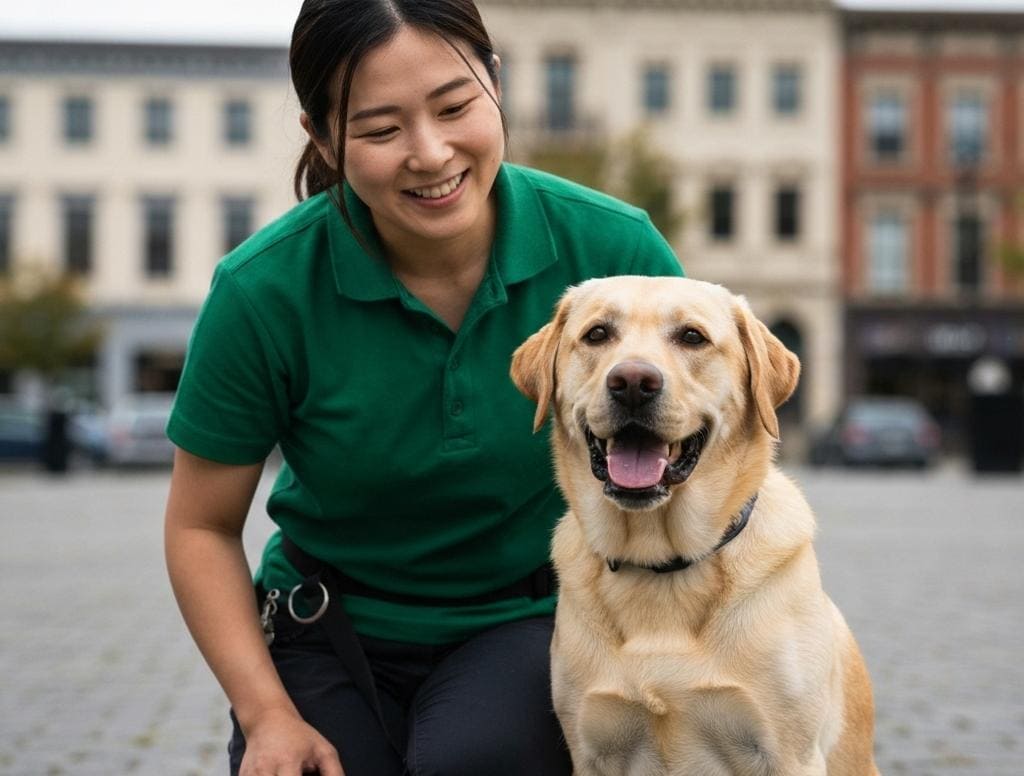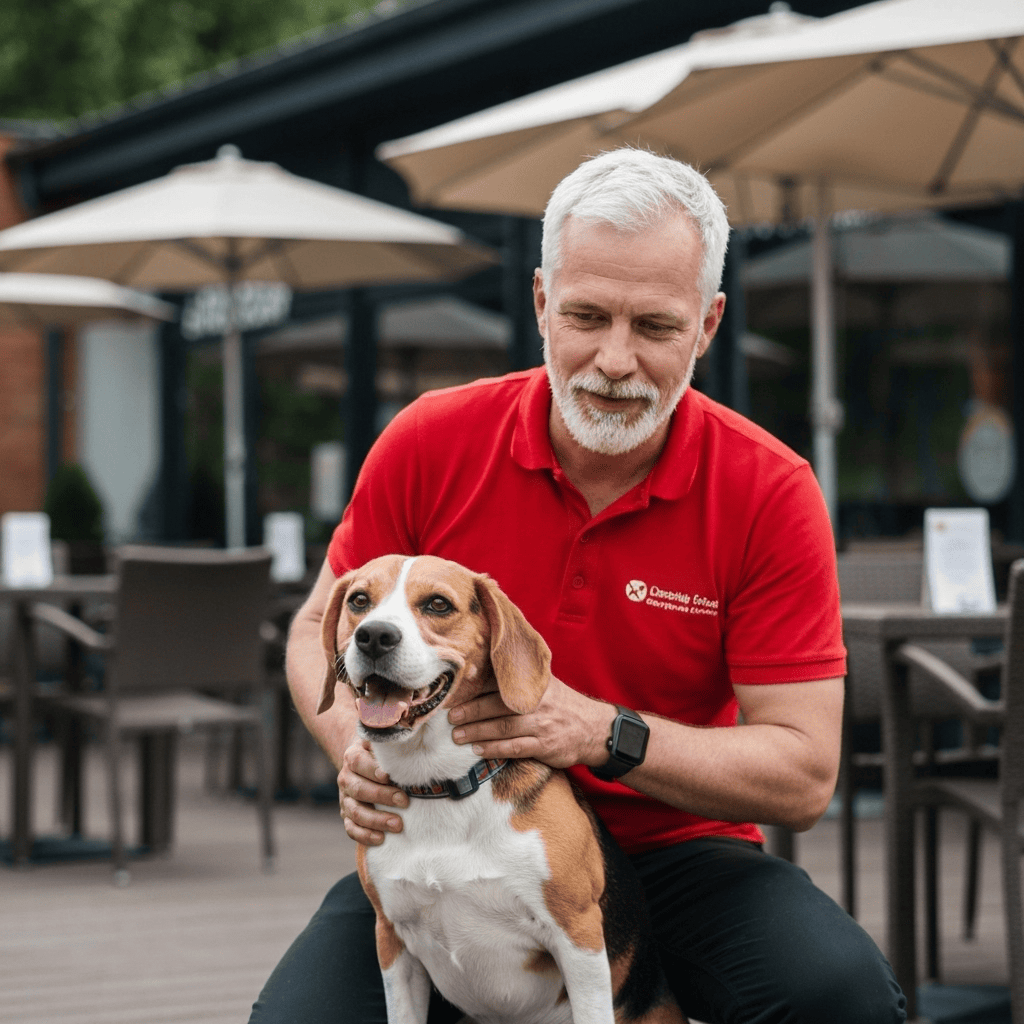Your Complete Guide to Choosing a Dog Trainer in Apex
Living with a dog in Apex means you’ll be walking the busy greenways, visiting family parks, and maybe catching weekend events around Salem Street. Your dog needs to handle all of this calmly, from loose-leash walks along the Apex Community Park loop to staying polite when crowds gather for PeakFest.
Since Apex sits in Wake County, most local rules follow town and county guidelines. When you find a trainer who understands these local details, you’ll get better results both at home and out in your community.
How to Choose the Right Trainer
Start by looking for someone who uses positive reinforcement training and can set realistic goals for your Apex lifestyle. This means your dog should learn to walk calmly on the Peakway, stay focused near busy youth sports fields, and handle vet visits without drama.
Credentials give you a quick way to compare trainers’ experience levels. Common dog trainer certifications include KPA-CTP, CPDT-KA, or IAABC-CDBC for behavior problems. If your dog has serious aggression issues, look for someone with CBCC-KA or a science-based program like CTC.
Ask how your trainer plans to work around Apex specifically. In-home sessions work great for puppy manners, door greetings, and neighborhood leash skills. Group classes make sense once your dog can focus around other dogs, especially before you try busy spots like Beaver Creek Commons. If your trainer wants to meet at parks, they should know Apex’s rules and when they need permits for commercial training.
Common Dog Training Methods Explained

Reward-based methods build the trust you want while creating lasting behavior changes. They also help you follow Wake County’s rules about keeping dogs under control in public.
Basic obedience covers sit, down, stay, place, recall, and leash skills so your dog can handle walks, restaurant patios, and park visits without pulling or jumping on people. Puppy training focuses on socialization, potty training, bite control, crate comfort, and early leash training. Starting with short, positive sessions prevents bad habits from forming in the first place.
Behavior modification addresses fear, reactivity, resource guarding, or separation anxiety through careful desensitization and counterconditioning. For serious cases, ask if your trainer works with local veterinarians. Private lessons and in-home dog training let you customize everything around your daily routines, while day training can speed up results when you’re short on time.
Group classes help your dog practice good manners around other dogs and people. The best classes give dogs plenty of space, screen participants carefully, and teach calm behavior rather than just excitement. Specialized training like therapy dog prep or service dog training requires extra structure, public-access skills, and a very clear step-by-step program.
Stay away from trainers who use fear, intimidation, or pain to get results. Humane methods are safer for everyone, easier to maintain long-term, and much better for keeping peace with your neighbors.
Average Cost of Dog Training in Apex NC (Updated for 2025)
Prices around Apex and Wake County depend on the trainer’s experience, how long sessions last, and where the training happens. Here’s what most local pet owners are paying in 2025.
| Service Type | Average Cost (Apex/Wake County) |
|---|---|
| Puppy classes (4–6 weeks) | $150–$275 total |
| Group obedience classes (4–6 weeks) | $160–$300 total |
| Private lessons (60–90 min) | $110–$190 per session |
| In-home coaching packages (4–6 visits) | $420–$900 total |
| Day training (trainer works your dog + handoff) | $450–$950 per week |
| Behavior consult for reactivity/anxiety (initial) | $150–$250 |
| Board and train (2–4 weeks) | $2,000–$4,500 total |
You’ll probably pay extra travel fees for longer distances within Wake County, and expect higher rates for complex behavior work. Make sure you understand what’s included, how the trainer tracks progress, and whether they offer a free consultation before you sign up.
Questions to Ask a Potential Dog Trainer
- What training methods do you use, and how do you keep sessions positive and low-stress?
- What credentials do you have, like KPA-CTP or CPDT-KA? Do you keep up with continuing education such as CPDT-KSA?
- How will you customize the training plan for my dog’s specific needs and our Apex lifestyle?
- Do you offer in-home visits, group classes, or day training, and which approach fits my goals best?
- How will we measure my dog’s progress and know when to add more distractions?
- What are the total costs, including any travel fees, and what’s your cancellation policy?
- Do you carry liability insurance, and can you show me proof?
- If we train in parks, do you have the permits required for commercial activities?
- For behavior problems, will you work with my veterinarian if needed?
- What should I practice between our sessions to help my dog keep improving?
Local Apex Rules and Considerations
Apex enforces leash laws and nuisance rules to keep parks and neighborhoods safe for everyone. Wake County follows North Carolina’s public health requirements too.
Leashes are required in all public spaces except inside designated dog parks. Keep a standard 6-foot leash with you for town greenways and community events. North Carolina law requires current rabies vaccination and a valid rabies tag for all dogs. You can get these through county clinics or your regular vet, and find more details at NCDHHS Rabies.
Excessive barking can be considered a nuisance, so work with your trainer on alert barking and separation anxiety before neighbors start complaining. If your trainer wants to use town parks for commercial sessions, they may need permits and proof of insurance.
North Carolina doesn’t require special licenses for dog trainers, but if a business boards dogs for payment, the state’s Animal Welfare Section oversees kennel licensing at NCDA&CS Animal Welfare. For lost pets, microchips, and other county resources, check Wake County Animal Center.
Local Apex Resources for Dog Owners
These spots give you great places to practice polite manners, work on recalls, and provide safe enrichment for your dog. Always follow the posted rules and etiquette guidelines.
Apex Nature Park Dog Park and Hunter Street Dog Park offer fenced areas with clear rules posted. Practice recalls and calm greetings during quieter times of day. You can find more options at City of Raleigh Dog Parks throughout Wake County.
Jack Smith Park Dog Park in Cary is close by and excellent for recall practice inside safe, fenced areas. Jordan Lake State Recreation Area welcomes leashed dogs on most trails and picnic areas, which gives you perfect opportunities to build focus around wildlife and families.

FAQs
How much does in-home dog training cost?
Most Apex trainers charge $110–$190 per in-home visit, with discounts available when you buy packages. Behavior problems typically start at the higher end of that range.
Is in-home dog training worth it?
Absolutely, because you’re working on problems exactly where they happen. Your trainer can fix door manners, jumping on guests, counter-surfing, and yard reactivity right at home, then step outside to practice leash skills on your actual neighborhood sidewalks.
Can you pay someone to house train your dog?
Yes, many trainers offer puppy programs that include potty training, crate routines, and daily schedules. Day training can speed up the process while teaching you how to maintain the progress.
What is the 3-3-3 rule for dog training?
This is a helpful timeline for new or adopted dogs: expect about 3 days for your dog to decompress, 3 weeks to learn your routines, and 3 months to feel completely settled. Good training plans work with this natural adjustment period.
How long will it take to reach my training goals?
Most puppies and friendly adult dogs show solid progress within 4–8 weeks if you practice daily. Fear, reactivity, or aggression typically requires several months of careful behavior modification with gradual increases in difficulty.
What should I bring to group classes?
Pack a flat collar or harness, a 6-foot leash, high-value treats, water, and current vaccination records if your trainer requests them. Leave retractable leashes at home for safety reasons.
What’s the leash law in Apex?
Dogs must be leashed and under control in all public areas, except inside designated off-leash dog parks. Keep that 6-foot leash handy for town greenways, playgrounds, and community events.
Do I need a dog license in Apex or Wake County?
Wake County doesn’t require general pet licenses, but keep your dog’s rabies vaccination current and the tag on their collar. For county services and microchip information, visit Wake County Animal Center.
What shots does my dog need in Wake County or North Carolina?
Rabies vaccination is required throughout the state. Your veterinarian may also recommend distemper-parvo and bordetella based on your dog’s lifestyle. Check state guidelines at NCDHHS Rabies.
Are dog trainers required to be licensed in Apex or Wake County or North Carolina?
No special trainer licenses exist in North Carolina. Trainers follow normal business regulations, but if they offer board and train services, their facility may need to be licensed as a boarding kennel under the state’s Animal Welfare Section: NCDA&CS Animal Welfare.
Where can I practice off-leash recall?
Use fenced dog parks in Apex or nearby Cary and Raleigh to keep things safe and legal. You can find Raleigh’s complete list at Raleigh Dog Parks. Try visiting during quieter hours when you’re starting out.
Which dog parks allow training around Apex?
Apex Nature Park Dog Park and Hunter Street Dog Park both allow off-leash play within their fenced areas. In nearby Cary, Jack Smith Park Dog Park is another solid option for practice sessions.
What beaches or trails allow dogs for training?
While there aren’t ocean beaches nearby, leashed dogs are welcome on most trails at Jordan Lake State Recreation Area. These trails are perfect for teaching calm focus around picnicking families, children, and wildlife.
The right combination of thoughtful planning, humane methods, and consistent practice around Apex’s parks and neighborhoods will help your dog become a confident, well-behaved companion. If credentials matter to you, don’t hesitate to ask about dog trainer certifications and how your trainer stays current with new techniques.